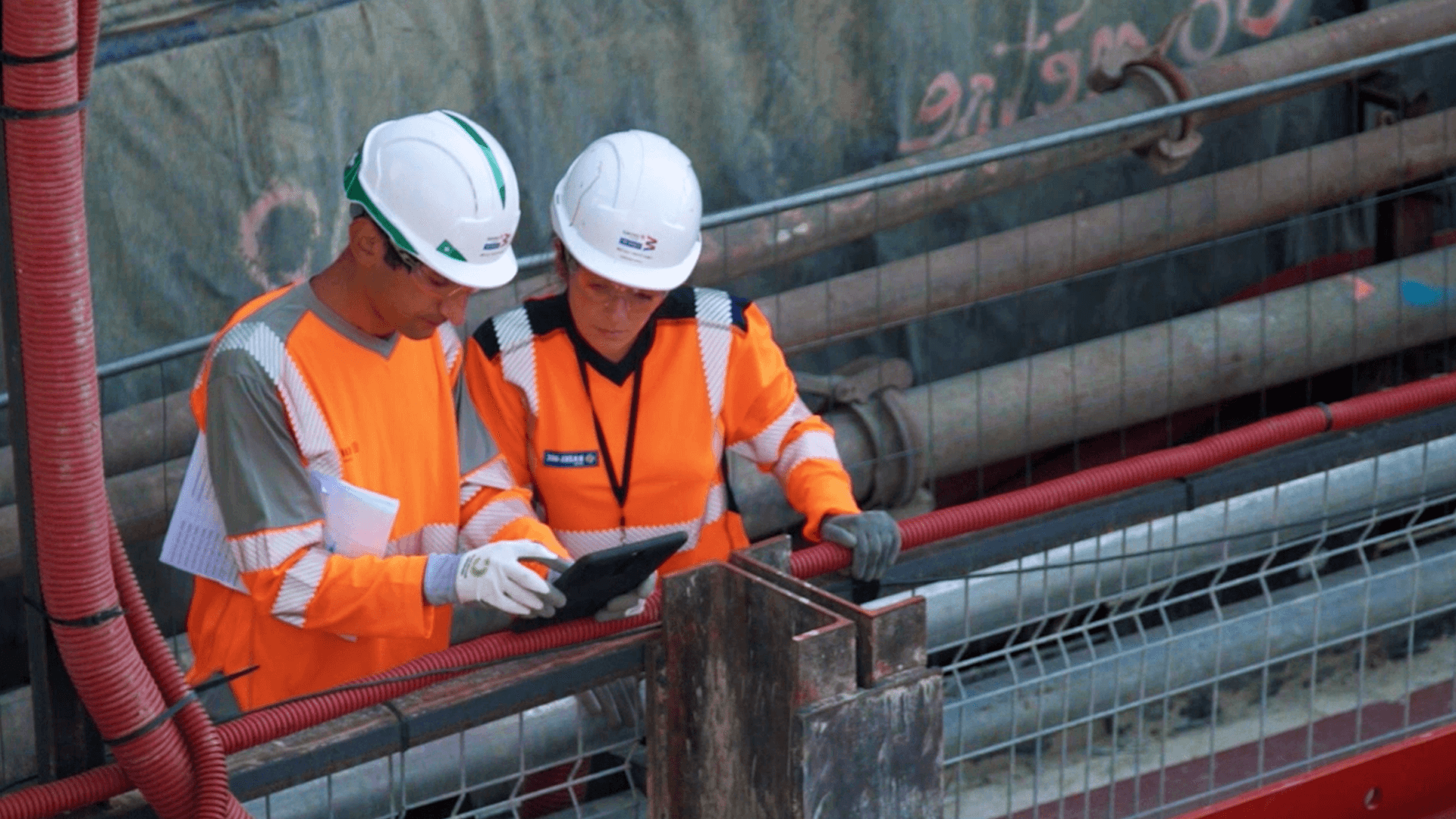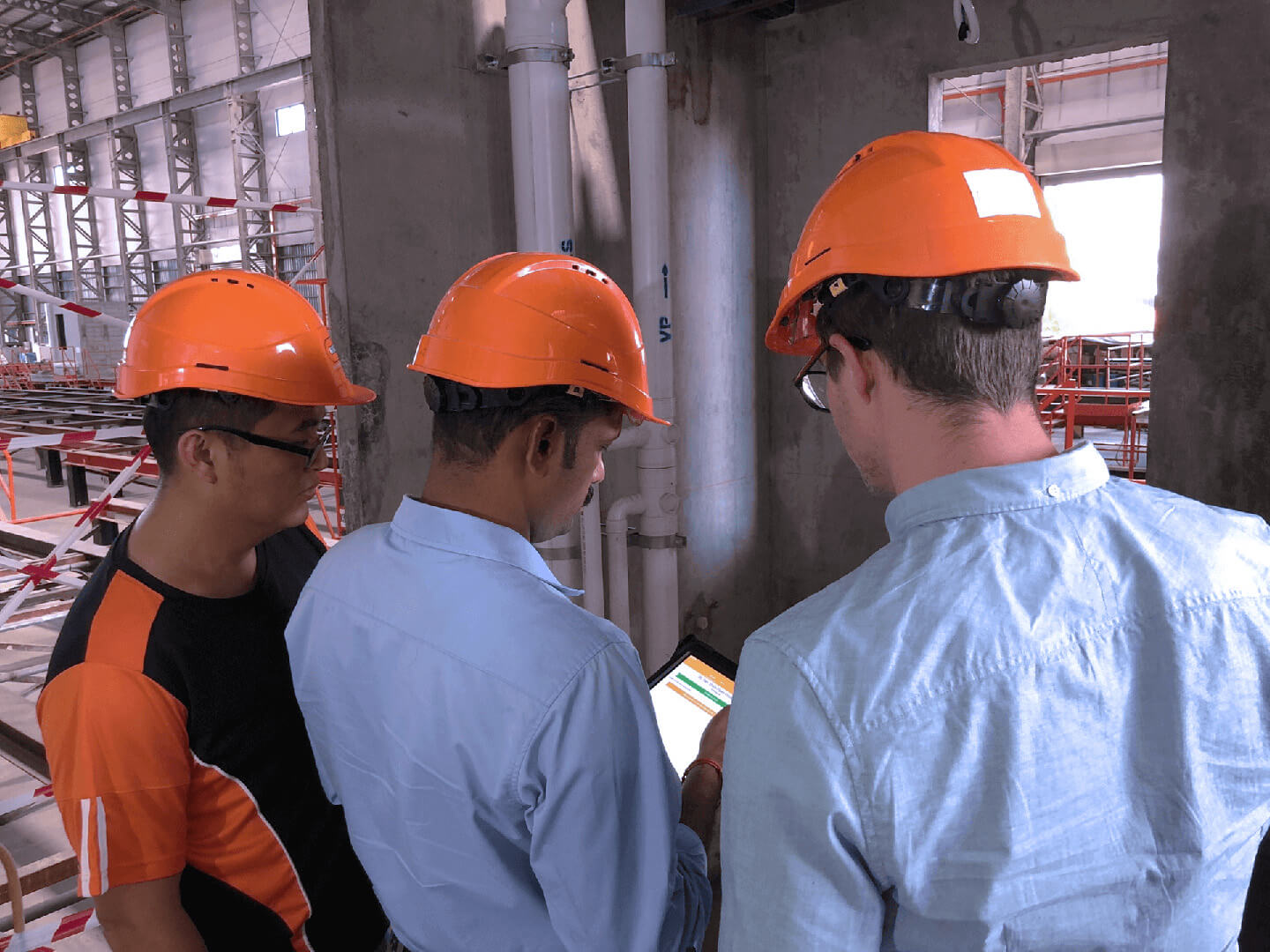Digitalisation in the construction industry: How to kickstart your journey
Featured topics:
- Which providers should I choose?
- Which software implementation strategy should I use?
- How do I get started?
- What’s the best way to drive change through my business?
- How important is training to the success of my digitalisation programme?
- How do I ‘keep it simple’ as the project scales?
- Is digitalisation right for my construction business?
Subscribe to our newsletter
Get the latest updates, trends and news directly in your inbox.
Introducing digital solutions to a construction business transforms its responsiveness to its customers, partners, and regulators. Access to real-time information helps teams make better decisions, improve productivity, and securely store and retrieve information quickly and easily. Your organisation will no longer rely on thousands of paper-based checklists, documents, forms, and reports: no more lost documents and no more compliance headaches.
Like any change programme, the success of digitalising your construction business comes down to how you manage the project, people, and processes. This article looks at the top questions you’ll need to consider when embarking on your digitalisation journey.

Which providers should I choose?
Selecting your technology partner is an important step. Strive to work with a provider who specialises in construction management software, understands your project vision, and naturally aligns with your organisational goals.
Research leading digital technology providers and check out their websites. Ensure the organisation has extensive experience in the building and construction industry and a strong client base. Make sure your shortlisted providers offer a one-stop shop solution to all your needs.
The ideal solution should include all aspects of field management such as quality assurance and quality control (QAQC), HSE compliance, progress tracking, equipment certifications, workers’ qualifications, maintenance inspections, and timecards. This prevents additional investment and coordination efforts when you need to scale. Schedule a demo to see their apps in action and speak with the sales teams to understand more.
What software implementation strategy should I use?
Once upon a time, software providers used a very structured and sequential method to implement software solutions. The project team would fully specify the client’s requirements in great detail. The team would then develop, test, and deploy the solution in the field, much like a ‘big bang’ launch. While this strategy was thorough, it lacked flexibility, was complex, and often led to project overruns and, sometimes, even failures.
Today, the most popular and successful implementation strategy is called ‘agile’. An agile approach is rolled out like a series of mini projects. It dramatically reduces the risk of things going wrong because you are testing various options, gathering feedback, setting priorities, and improving as you go, process by process. While the programme of work is still structured and organised, the project focuses on quick wins, iteration, and smaller, more successful outcomes.
With cloud-based technology, you can digitalise all on-site processes quickly and easily. But that doesn’t mean everything will be seamless. All change requires some level of effort and adjustment. It’s not uncommon for an agile project to start with a few challenges that get ironed out as the project proceeds.
How do I get started?
Once you have decided on a provider and an implementation strategy, it’s time to select a pilot project to set you up for success. Tackling a company-wide implementation is not recommended. Best practice digital transformations take place one process at a time. Running a pilot project helps you control the process, learn and iterate, and reduces your overall risks.
To help you along the way, ask yourself the following questions:
- What does success look like, and how will that success be measured?
- Have you clearly identified the processes you want to digitalise?
- What is the timing of the project, and what does that mean to business-as-usual workloads for team members?
- Have you identified vital users or ‘champions’ who will help you drive user adoption?
- Have you identified other key people who will be involved? Do they know the project is coming? Do they have the information they need to support the project?
- How will you capture learnings for future technology projects?

What’s the best way to drive change through my business?
While project management involves scheduling tasks to keep the project on track, change management is all about working with people affected by the project.
Change is a natural part of every digitalisation project. But some shifts can make people uncertain, which can lead to anxiety, confusion, and resistance.
Change is a process, and it doesn’t happen by itself. Leaders managing successful digitalisation projects take the time to prepare their organisations for change. They create a vision so people can rally around the project, ensure improvements are implemented as promised, remove obstacles, and embed the new practices. Once they’ve finished the project, their teams assess the results and capture learnings for the future.
Providing your construction teams with regular communication upfront helps to build trust and support. It’s essential to think about how you will take your people on the journey with you. As one example, you could seek assistance from senior team members who can advocate for the project and its longer-term benefits.
Some questions your team members may want answers to include:
- Why is the project happening now?
- What benefits will the app and project deliver for the organisation and its people?
- How will the platform be implemented?
- How will the new software affect how people do their jobs now and in the future?
Sharing the facts and communicating clearly helps people understand what is happening and why.
It’s also crucial to select the right subject matter experts and users as project champions for each area experiencing change. Promising candidates are likely to be team members who:
- have detailed knowledge of the processes and content being changed, and are positive about the project and its benefits
- freely embrace technology
- are logical thinkers who can ‘keep things simple’
- are naturally results-focused
How important is training to the success of my digitalisation programme?
Training is a tried-and-true way to fast-track the adoption of new technology. You can train team members directly or use your network of champions to teach others (train the trainer model).
When planning your training sessions, think about how to:
- design and deliver the programme in order of impact, with those heavily affected going first
- give everyone access to the app and encourage them to experiment, learn, and ask questions
- ensure the training, either online or in-person, takes place in a comfortable environment so people can learn at their best
- clarify expectations, including explaining what tasks will be done by which group of people; this is particularly important if the changes are different to the status quo
- provide a safe place for people to share feedback
While it may be tempting to set aside a modest training budget, ensure those training your team have the resources they need to support your team through the learning process.

How do I ‘keep it simple’ as the project scales?
Keeping things simple is easier said than done. Many project teams run the risk of overcomplicating things if they don’t have defined goals, dedicated project roles, a strong project lead, and clear, two-way communication.
Digitalising your construction processes can help to transform your business and set up your success for the future. To ensure your journey is a successful one, remember to:
- work with an experienced technology partner who has similar values
- adopt an ‘agile’ implementation strategy
- use pilot projects
- handpick experienced individuals as champions and early adopters
- effectively communicate with your people and manage change
- invest in training
- focus on straightforward goals from the outset and keep it simple
Is digitalisation right for your construction businesses?
While technology is transforming many leading construction businesses worldwide, digitalising processes aren’t without their challenges. Each organisation needs to be honest about its ability to support its people through such a strategic project.
Remember to kickstart the process with the right construction management software provider, and together, develop the most appropriate implementation strategy. Persevere through the journey and keep things simple as you scale. As you progress, you will reap the rewards of digitalisation and propel your business to greater heights.

Axel Plumet is the senior manager for APAC Services in Novade. Based in Singapore, he guides a team of consultants in undertaking client servicing. Axel has a master’s degree in civil engineering from INSA Toulouse, France.
Novade has a team of digital specialists dedicated to supporting clients in their digital transformation from the ground up. With global experience on a wide range of construction projects and processes, the team will be able to quickly adapt to your needs from specification through to delivery and on-site support.
- Learn more about Novade’s digital construction platform
- Learn more about Novade’s software for contractors
- Learn more about Novade’s property development software
The rise of AI in construction management
The rise of AI in construction managementFeatured topics: Introduction: Why AI matters in construction What Is AI and how does it apply to construction? Key use cases of AI in construction management What’s needed to make AI work on site? Common myths and challenges...
Introduction to safety management system
Introduction to Safety Management System (SMS)Featured topics: What is a Safety Management System? Why a Safety Management System matters Safety Management System: The four key elements Why different industries need a tailored approach Common challenges in...
Trends in construction software in Thailand
Construction software trends in ThailandInsights from Khun Pasas, CEO of VR Digital Interview by Denis Branthonne During a recent visit to Bangkok, I had the pleasure of sitting down with Khun Pasas, the Director and Founder of VR Digital. VR Digital is a leading...
The rise of AI in construction management
The rise of AI in construction managementFeatured topics: Introduction: Why AI matters in construction What Is AI and how does it apply to construction? Key use cases of AI in construction management What’s needed to make AI work on site? Common myths and challenges...
Introduction to safety management system
Introduction to Safety Management System (SMS)Featured topics: What is a Safety Management System? Why a Safety Management System matters Safety Management System: The four key elements Why different industries need a tailored approach Common challenges in...





